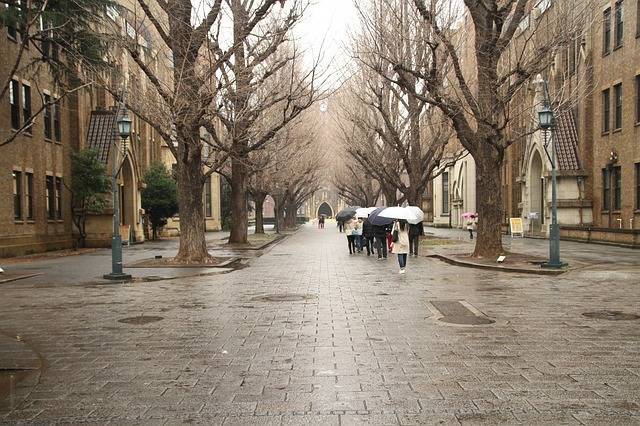Outline Of The University Exchange Programs In JapanIn order to obtain a student visa, you will be required to either have one million yen or the equivalent in financial aid awards, to cover your living expenses. With a student visa, you may obtain an additional permission form from Immigration to legally work up to 28 hours per week. The cheapest way to stay in Japan for a longer period of time is to study at a local school or university with a generous Monbukagakusho which is a scholarship offered by the MEXT [Ministry of Education, Culture, Sports, Science and Technology (Monbu-kagaku-sho)], where they pay for it all. To date, some 65,000 students from approximately 160 countries and regions around the world have studied in Japan under the Japanese Government Scholarship program established in 1954. Those wishing to apply for a scholarship should meet one of the criteria listed below: Embassy recommendation: In this type of scholarship, scholarship recipients are recruited and initially screened by a Japanese embassy (or consulate general, depending on the country). Research student, Undergraduate student, College of technology student, and Special training college student recruitment for the next fiscal year (April, October) is made between March and May. The initial screening (documentary examination, written test and interview) is made at the embassy between June and August. The embassy then recommends the selected candidates to the Japanese Ministry of Education, Culture, Sports, Science and Technology through the Ministry of Foreign Affairs by the beginning of September. Teacher training and Japanese studies student recruitment for the next fiscal year (for those arriving in Japan in October) is made between December of the previous year and the following February. Screening is conducted between mid-February and March. Selected candidates are recommended to the Japanese Ministry of Education, Culture, Sports, Science and Technology through the Ministry of Foreign Affairs by end of April. University Recommendation: Research students and Japanese studies students who will be studying in Japan as an exchange student based on inter-university student exchange agreements can be screened through the national, public or private Japanese university involved as a candidate for a Japanese Government Scholarship. The university directly recommends the selected candidates to the Japanese Ministry of Education, Culture, Sports, Science and Technology. Research students recommended by a university for study in Japan as government-sponsored scholarship recipients basically arrive in Japan in October. Japanese studies students basically arrive in Japan in October according to the university program. Universities recommend candidates to the Ministry of Education, Culture, Sports, Science and Technology by mid-April. Domestic Selection: Privately financed, full-time postgraduate foreign students, prospective postgraduate students, and full-time, prospective fourth-year undergraduate university students (prospective sixth-year students in the case of medical schools, etc.) are granted domestic selection scholarships that begin in April. Recruitment is conducted through national, public and private universities with the exception of junior colleges. Universities carefully screen academically and individually excellent students and recommend them by mid-December as government-sponsored scholarship candidates to the Ministry of Education, Culture, Sports, Science and Technology. There are seven types of Japanese government-sponsored scholarships available under the Japanese Government (Monbu-kagaku-sho) Scholarship program: Research StudentsYou must be under 35 years of age and a college graduate (includes prospective graduates). Or you must have completed 16 years of schooling. This program allows the recipients to apply for a Graduate Degree Program (Masters and/or PhD) given that they passed their assigned University's entrance examination. Teacher Training StudentsYou must be under 35 years of age and a graduate of a college or teacher training college. You must have at least five years of active experience as a teacher in a primary, secondary or teacher training college in your country. (Please note that college and university teachers currently in active service are not considered for this scholarship). Undergraduate University StudentsYou must be at least 17 and under 22 years of age and have completed 12 years of school education or have completed courses in a school comparable to a high school (includes prospective graduates). Every year a large number of students are enrolled by embassy recommendation (see below). Each half of the contingent undergoes a 1-year preparatory program at either Osaka University "Center for Japanese Language and Culture" or Tokyo University of "Foreign Studies" before entering a 4-year undergraduate program at one of 86 Japanese National Universities. Japanese Studies StudentsApplicants must be from 18 to 30 years old. Applicants must be enrolled as undergraduate students in faculties or schools which major in Japanese language or Japanese culture in a university outside Japan at the time when they come to Japan and must be enrolled in the home institution at the time when they return to their home countries. Students majoring in the fields other than Japanese language or Japanese culture who wish to study various aspects of Japan (engineering, economy, agriculture, architecture, art, etc.) as part of their major studies should apply to the JASSO (Japan Student Services Organization) for admission to the Short-term Student Exchange Promotion Program. College Of Technology StudentsYou must be at least 17 and under 22 years of age and have completed school education comparable to a high school (a minimum of 11 years beginning in primary school) education (includes prospective graduates). Special Training College StudentsYou must be at least 17 and under 22 years of age and have completed 12 years of schooling or have completed school education comparable to a Japanese high school (includes prospective graduates). Young Leaders' Program (YLP) StudentsApplicants must be young public administrators and so on, from Asian and other countries participating in the YLP who are expected to play active roles as future national leaders in their respective countries. The participants must be university or college graduates, who have at least 3–5 years' work experiences in public administration or enterprises and so on. The screening of the participants is based on recommendations of the recommending authorities. A number of Japanese universities offer courses taught in English; some foreign universities also operate independent programs in Japan, the largest being Temple University's multi-faculty campus in Tokyo. Japan's top universities are also very well regarded worldwide, though the downside is that degree programs are almost always conducted exclusively in Japanese. The tests for "Japanese Language Proficiency Test" are held twice a year within and outside of Japan, and more information can be found on the JLPT website. Nevertheless, many of them have exchange agreements with other foreign universities, and you can apply to go on exchange for a semester or a year. Among the most prestigious are the University of Tokyo, Waseda University and Keio University in Tokyo, as well as Kyoto University in Kyoto. Guide To Study In JapanThe guide to study in Japan is a website for people who are interested in studying in Japan. Here you will find the name of all universities, junior colleges and vocational schools in Japan. Visitors can request a school catalogs for free. "The postage to overseas address is also free of charge". More Reading:
0 Comments
Leave a Reply. |
Halal In Japan
|
|



 RSS Feed
RSS Feed





